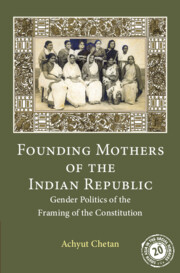Book contents
- Frontmatter
- Dedication
- Contents
- List of Images
- Preface
- Acknowledgements
- List of Abbreviations
- Introduction: Towards a Feminist Reading of the Making of the Constitution
- 1 In the Shadow of the Founding Fathers
- 2 In Search of the Missing Mothers
- 3 Women’s Moral Imaginary and Constitutional Politics: 1927–1946
- 4 Patterns of Participation: Women Members in the Constituent Assembly
- 5 Writing the Rights: Inscribing Constitutional Morality
- 6 Reformulating the ‘Woman Question’: Challenging Customs and Traditions
- 7 After the Framing
- Conclusion: Remembering the Founding Mothers
- Appendix: Texts and Contexts of the Framing – A Timeline
- Bibliography
- Index
5 - Writing the Rights: Inscribing Constitutional Morality
Published online by Cambridge University Press: 27 September 2022
- Frontmatter
- Dedication
- Contents
- List of Images
- Preface
- Acknowledgements
- List of Abbreviations
- Introduction: Towards a Feminist Reading of the Making of the Constitution
- 1 In the Shadow of the Founding Fathers
- 2 In Search of the Missing Mothers
- 3 Women’s Moral Imaginary and Constitutional Politics: 1927–1946
- 4 Patterns of Participation: Women Members in the Constituent Assembly
- 5 Writing the Rights: Inscribing Constitutional Morality
- 6 Reformulating the ‘Woman Question’: Challenging Customs and Traditions
- 7 After the Framing
- Conclusion: Remembering the Founding Mothers
- Appendix: Texts and Contexts of the Framing – A Timeline
- Bibliography
- Index
Summary
Man must be greater than the institutions he creates. The success of government does not depend so much on the perfection of constitutions as on conditions in the environment which again are dependent on the quality of the citizens.
—Amrit Kaur, 1945Women members of the Constituent Assembly were profoundly aware of the foundational role the Constitution would play in shaping the destiny of the nation. Almost every aspect of the framing, from the complex textual process to its political creativity, was marked and influenced by their participation. The Constitution was meant to prepare the blueprint of the political programme of the state, envisaged by the women members as a moral agency whose contours they were eager to shape. The women framers wanted the Constitution to be more than a regulating text. No article of the Constitution was considered irrelevant by them for each article affected the other, and together shaped the entire structure of the democratic state.
Their level of intensity and overall attention were matched only by that of the Chairman of the Drafting Committee. For them, as for Ambedkar, the new, ethical distribution of political power had to flow from a text that would create conditions for the diffusion of the principles of the Constitution. They shared with Ambedkar a sceptical attitude towards the romantic celebration of Indian heritage and culture. His remark that ‘democracy is only a top-dressing on Indian soil’, in connection with the need for cultivating constitutional morality was echoed by the women in the Assembly who knew that the Indian ‘people have been used to centuries of autocratic rule and, therefore, to carry on more or less on the lines they have been accustomed for some time’.
The main features of their interventions, therefore, included attention to the processes and form of constitutional practices. Women were aware that ‘constitutional morality is not a natural sentiment’ and realized that each institution of the polity would contribute to its diffusion. In Ambedkar's words, it was important to recognize that ‘the form of administration has a close connection with the form of the Constitution’ and that ‘it is perfectly possible to pervert the Constitution, without changing its form by merely changing the form of the administration and to make it inconsistent and opposed to the spirit of the Constitution’.
- Type
- Chapter
- Information
- Founding Mothers of the Indian RepublicGender Politics of the Framing of the Constitution, pp. 167 - 212Publisher: Cambridge University PressPrint publication year: 2023



